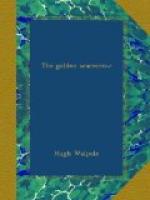Then, quite suddenly, as though she had sprung out of the fountain, Mary Adams was there. Mary Adams was aged nine, and her difference from Barbara Flint was that, whereas Barbara craved for affection, she craved for attention: the two demands can be easily confused. Mary Adams was the only child of an aged philosopher, Mr. Adams, who, contrary to all that philosophy teaches, had married a young wife. The young wife, pleased that Mary was so unlike her father, made much of her, and Mary was delighted to be made much of. She was a little girl with flaxen hair, blue eyes, and a fine pink-and-white colouring. In a few years’ time she will be so sure of the attention that her appearance is winning for her that she will make no effort to secure adherents, but just now she is not sufficiently confident—she must take trouble. She took trouble with Barbara.
Sitting neatly upon a seat, Mary watched rude little boys throw sidelong glances in her direction. Her long black legs were quivering with the perception of their interest, even though her eyes were haughtily indifferent. It was then that Barbara, with Miss Letts, an absent-minded companion, came and sat by her side. Barbara and Mary had met at a party—not quite on equal terms, because nine to seven is as sixty to thirty—but they had played hide-and-seek together, and had, by chance, hidden in the same cupboard.
The little boys had moved away, and Mary Adams’s legs dropped, suddenly, their tension.
“I’m going to a party to-night,” Mary said, with a studied indifference.
Miss Letts knew of Mary’s parents, and that, socially, they were “all right”—a little more “all right,” were we to be honest, than Mr. and Mrs. Flint. She said, therefore:
“Are you, dear? That will be nice for you.”
Instantly Barbara was trembling with excitement. She knew that the remark had been made to her and not at all to Miss Letts. Barbara entered once again, and instantly, upon the field of the passions. Here she was fated by her temperament to be in all cases a miserable victim, because panic, whether she were accepted or rejected by the object of her devotion, reduced her to incoherent foolishness; she could only be foolish now, and, although her heart beat like a leaping animal inside her, allowed Miss Letts to carry on the conversation.
But Miss Letts’s wandering eye hurt Mary’s pride. She was not really interested in her, and once Mary had come to that conclusion about any one, complete, utter oblivion enveloped them. She perceived, however, Barbara’s agitation, and at that, flattered and appeased, she was amiable again. There followed between the two a strangled and disconnected conversation.
Mary began:
“I’ve got four dolls at home.”
“Have you?” breathlessly from Barbara. By such slow accuracies as these are we conveyed, all our poor mortal days, from realism to romance, and with a shocking precipitance are we afterwards flung back, out of romance into realism, our natural home, again.




